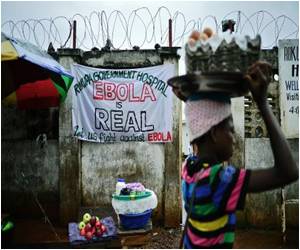The emergency coordinator for Doctors Without Borders (Medecins sans Frontieres) in Sierra Leone has said it was inadequate.

"The current international Ebola response remains dangerously inadequate," she said.
Ebola is a highly contagious virus that causes vomiting, diarrhea, and bleeding. It first emerged in 1976, and has been fatal in over half of cases in West Africa since the start of the year.
More than 1,400 people across Sierra Leone, Guinea, Liberia and Nigeria have been killed in the largest Ebola outbreak to date, according to the World Health Organization's latest tally.
Sierra Leone has already lost its top Ebola doctor to the disease, and a Senegalese epidemiologist working there was airlifted this week to Germany for treatment.
Healthcare workers are at particular risk of coming down with the infection, so they wear extensive personal protective equipment (PPE) to shield the skin from exposure.
Advertisement
She also wrote of the fear she sees in patients when they are assigned to a tent for confirmed Ebola cases, and how she helped care for a boy, 6, and his sister, 3, whose parents and grandmother had died from Ebola.
Advertisement
"When the boy died, we tried to console and calm his sister, but the PPE made it difficult to touch her, to hold her, even to speak with her. She died the next day."
- Frustration, problems -
Wolz also told of a "sad frustration in seeing patients arrive too late -- and in knowing that many sick people are hiding, fearing the effects of a diagnosis of this stigmatized disease."
But there are moments when the staff can celebrate, like after a patient has received supportive care and fluids, and makes it through the infection, she said.
A patient who gets a negative blood test and goes three days without symptoms can return home.
"Discharging a patient is our happiest moment -- we gather outside the center, clapping and dancing in a celebration that motivates us to keep going."
However, those moments can be overshadowed by the sheer volume of new patients. On the day she wrote the piece, four patients were released, and eight people were admitted.
Key problems with the response include the inability to trace all people who may have come in contact with an infected person, she said.
An alert system that should be sending an investigation team and ambulance to any village where a suspected case or death is reported "is not functioning properly," she added.
Even more, the Ministry of Health has just four ambulances in a district with 470,000 people.
"Every day sees deaths in the community that are surely caused by Ebola, but they are not counted by the Ministry of Health because the cause has not been confirmed by laboratory testing," she said, describing the surveillance system as "non-functional."
Health professionals say they need a solid understanding of the chain of transmission in order to stop the virus from spreading.
"My time in Kailahun has been frustrating and disappointing, because I know from previous outbreaks what is required to control this one," she said.
"We need to be one step ahead of this outbreak, but right now we are five steps behind."
Source-AFP










